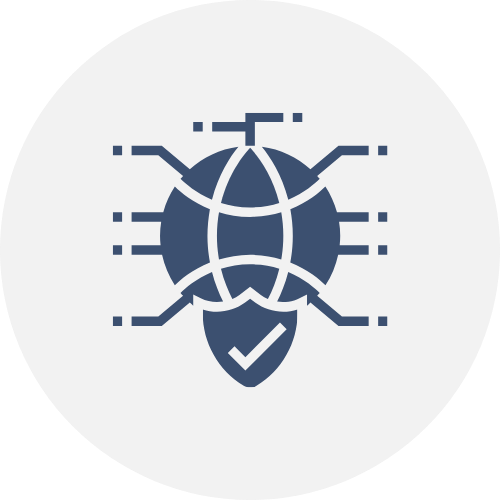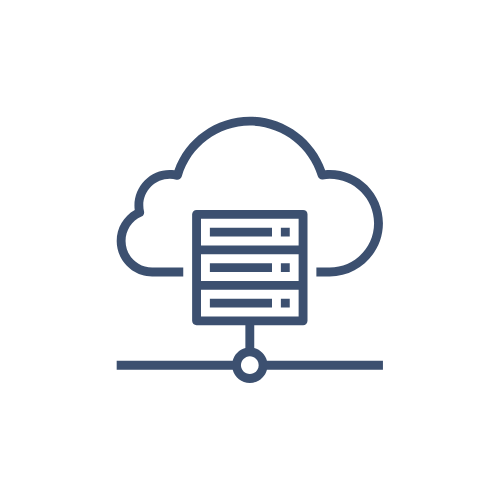COVID-19 Cybersecurity Resources
Cyber threat actors are attempting to capitalize on the coronavirus outbreak. If you’re telecommuting, our featured resources will help you bolster cybersecurity at home and keep you up to date on the latest developments as the pandemic continues to impact the globe.
Telecommuting Tips

Navigating New Challenges This Academic School Year
Students, faculty, parents, and guardians across New Jersey are preparing for the beginning of a new academic school year unlike any other. As academic institutions reopen for the 2020-2021 school year, the pandemic put a new spin on the typical back-to-school stress. . . .

Tips for Teleworkers, Remote Access Security
Telework Program Fundamentals: For many organizations, telework programs have been in practice for years – whether as part of the organization’s everyday work program or as a component of their business continuity plans. For those organizations, policies, educational programs, technologies, and support services for the remote workforce are well established . . .

The NJCCIC's Guide to Configuring & Securing a Home Wi-Fi Router
A great way to reduce your cyber risk is to ensure your home Wi-Fi network is properly configured and secured. Think about how many devices are connected to your home’s wireless network right now. In modern households, there could easily be a dozen or more connected devices. Laptop computers, tablets, . . .

The Importance of Multi-Factor Authentication
Knock, Knock – Who’s There? This month, another collection of user ID’s and passwords was released on the dark web. It includes more than 2 billion records that have been compiled from data breaches dating back as far as 2008. Identity and authentication mechanisms - i.e. usernames and passwords - . . .

CISA: Enterprise VPN Security
As organizations prepare for possible impacts of Coronavirus Disease 2019 (COVID-19), many may consider alternate workplace options for their employees. Remote work options—or telework—require an enterprise virtual private network (VPN) solution to connect employees to an organization’s information technology (IT) network . . .
Key Alerts

05/01/20: US Federal Reserve Economic Relief Phishing Campaign
The NJCCIC’s email security solution has identified and blocked multiple COVID-19 phishing campaigns consistent with open-source reporting , including those recently impersonating the US Federal Reserve with economic relief options through the Payment Protection Program in order to steal banking credentials. Phishing emails from the “Federal Reserve System” contain ...

05/01/20: Threat Actors Capitalize on Unemployment Fears
As the current pandemic has caused occupational loss and furloughs, cyber-criminals are capitalizing on unemployment concerns. One campaign currently circulating is a phishing email crafted to appear as a Zoom meeting invitation that requests the recipient to join for the purpose of “contract suspension” or “termination trial.” Additionally, the ...

05/01/20: Threat Actors Target Trucking Companies
The logistics industry, including trucking companies, has played a critical role during the COVID-19 pandemic despite supply shortages. Threat actors are taking advantage of this crisis through vishing attempts offering fraudulent loan forgiveness to small businesses from the CARES Act, impersonation scams of legitimate logistic companies offering fake work-from-home ...

04/24/20: Remote Access Causing Network Security Issues
Due to COVID-19, many employers have instructed their staff to work remotely. A large portion of these employees will require remote access to their company’s internal network to complete their duties and responsibilities through the use of remote access services like Remote Desktop Protocol (RDP). Providing remote access needs . . .

04/24/20: While COVID-19 Tactics Increase, Traditional Phishing Still Circulating
There have been numerous new phishing campaigns referencing the COVID-19 pandemic; however, it is important to highlight the traditional tactics still being deployed. The NJCCIC’s email security solution has identified several campaigns purporting to be from banks or vendors that attempt to steal credentials or download malware. For example . . .

04/24/20: COVID-19 Phishing Campaign Spreads TrickBot
TrickBot was first known as a banking trojan and evolved into a malware downloader. It can maintain persistence on infected systems and networks and operate with botnet-like capabilities. The latest tactic is a phishing campaign purporting to be from volunteer or humanitarian groups offering free COVID-19 medical advice and . . .

04/22/20: Online Extortion Scams Increasing During the COVID-19 Crisis
The Internet Crime Complaint Center (IC3) has seen an increase in reports of online extortion scams during the current "stay-at-home" orders due to the COVID-19 crisis. Because large swaths of the population are staying at home and likely using the computer more than usual, scammers may use this opportunity . . .

04/17/20: COVID-19 Economic Relief Increases Risk of Identity Theft & Fraud
As a result of the COVID-19 pandemic, millions of people are receiving economic relief, including unemployment benefits, economic stimulus funds, accelerated payments, and obligations and contract awards. Additionally, there has been an increase in data breaches, access to stolen identities and fraud handbooks from dark web markets, phishing attacks . . .

04/17/20: White House Phishing Campaigns
Email security firm Inky discovered phishing campaigns in which threat actors attempt to impersonate the White House in order to distribute malware. One of the phishing campaigns contains a link that, if clicked, will direct the target to a spoofed White House website. A document containing Coronavirus guidelines is . . .

04/10: IRS Warning for Coronavirus-Related Scams for Economic Impact Payments
In response to recent economic impact payments, the Internal Revenue Service (IRS) is warning taxpayers of Coronavirus-related scams, which may lead to tax-related fraud and identity theft. There have been attempts through phishing emails, vishing, websites, and social media. Retirees and seniors are among those targeted — particularly if ...

04/10: COVID-19 Cyber Threats
As the COVID-19 pandemic continues, cyber threat actors continue to use the crisis to victimize individuals, businesses, and organizations. The NJCCIC has observed various phishing campaigns attempting to deliver malicious emails to NJ state employees. These emails use various tactics to trick recipients to click links, open attachments, divulge ...

04/08/20: Cyber Threats & Cybersecurity for Healthcare During COVID-19
As the healthcare sector ramps up operations to manage the influx of COVID-19 cases, major organizational and networked system changes may leave them vulnerable to cyberattacks. Cyber-criminals are already targeting healthcare organizations—specifically hospitals—with phishing campaigns, ransomware, and other malicious acts that can adversely impact health information technology, medical response, . . .

04/03/20: VTC Platforms, Such as Zoom, Increasingly Targeted by Threat Actors
As more individuals transition to remote work, threat actors are targeting various popular video-teleconferencing (VTC) platforms that facilitate communications in a remote environment. Zoom, in particular, has been a target as of late, taking advantage of weaknesses in the platform’s default security and privacy settings. There have been recent ...

04/03/20: Remote Work Security and Teleconferencing Applications
Threat actors continue to capitalize on global issues and current trends, with coronavirus-themed attacks dominating more than 80 percent of the threat landscape. Across New Jersey, there has been a substantial increase in remote work and the use of technology such as virtual private networks (VPNs). The use of . . .

04/03/20: FBI Warns Teleconference Platforms Targeted for VTC Hijacking
As many citizens transition to teleworking and home education due to COVID-19, multiple video-teleconferencing (VTC) platforms have become targets for threat actors. The FBI Boston Division stated they have received multiple reports of conferences and virtual classrooms being disrupted by pornographic and/or hate images and threatening language. This type . . .

04/03/20: Zeus Sphinx Banking Trojan and Other COVID-19 Financial Relief Phishing Campaigns
After three years, the Zeus Sphinx banking trojan has resurfaced in coronavirus-themed phishing campaigns containing information on government relief payments. If the Microsoft Word password-protected attachment is opened and macros is enabled, the payload will be installed and used to harvest user credentials, authentication codes, and financial data via . . .

04/03/20: Threat Actors Target SMBs Using Government Grant Phishing Emails
Threat actors are targeting Small and Midsize Businesses (SMBs) with phishing emails in an attempt to deliver the Remcos remote access trojan (RAT). Aimed at SMBs that may be experiencing financial problems from COVID-19 shutdowns, the threat actor impersonates the US Small Business Administration (US SBA). The email closely . . .

03/27/20: COVID-19 Cyber Threats Continue to Evolve
Almost every day, new cyber threats are revealed that exploit public concern over COVID-19, from malicious emails and compromised sites to various scams. This week, two websites promoted a fake anti-virus software that, when downloaded, installed the BlackNET remote access trojan and added the compromised system to a botnet . . .

03/27/20: Phishing Emails Claim to be from WHO Director-General
A new phishing campaign delivers emails purportedly from the Director-General of the World Health Organization (WHO) Tedros Adhanom Ghebreyesus. The emails contain an attachment, named CURE.exe, that supposedly includes information on drugs for the prevention and treatment of COVID-19 . . .

03/23/20: Defending Against Global Viruses
Many individuals and businesses are focused on the current COVID-19 pandemic, which may cause them to become distracted and unguarded from cyber threats and miss key indicators, potentially leading to network compromise and malware/ransomware infections. Threat actors are taking advantage of this opportune time to target organizations, business, and private citizens . . .

03/16/20: Cyber Threat Actors Capitalize on Coronavirus
More social engineering campaigns have been publicized this week in which various cyber threat actors capitalize on the global concern over the novel coronavirus, COVID-19. Email and social media-based phishing scams referencing the virus attempt to convince recipients to open links or attachments to direct users to malicious websites or deliver malware, reveal . . .
COVID-19 Resources

New Jersey COVID-19 Information Hub
For live updates on the status of COVID-19 cases in New Jersey, as well as test site information, frequently asked questions, and much more, the New Jersey COVID-19 Information Hub is the state's number one resource for information regarding the novel coronavirus pandemic.

NJOHSP COVID-19 Rumor Control & Disinformation Updates
From the New Jersey Office of Homeland Security and Preparedness, the COVID-19 Rumor Control & Disinformation FAQs has been established to distinguish between facts and rumors/disinformation regarding the novel coronavirus pandemic. This resource will continue to be updated as more information becomes available.










